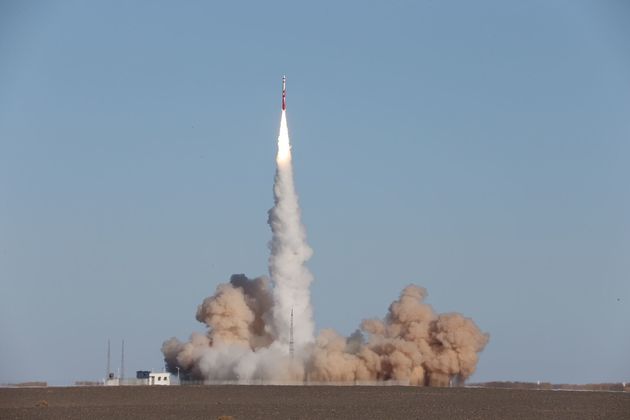
Photo/VCG
Oct. 29 (NBD) – China's first private-sector attempt to send the satellite into space suffered a setback as the carrier rocket failed to reach orbit.
Zhuque-1, which was developed by Beijing-based private company LandSpace, faced anomaly at the third stage after taking off in Jiuquan Satellite Center on Saturday, according to the company's statement.
The rocket was scheduled to send satellite Weilai-1 ("Future") into Sun-synchronous orbit for state media China Central Television.
Founded in 2015, LandSpace is China's first private rocket enterprise to obtain license for launching carrier rocket. The company regards Zhuque-1 as a fulfilled mission since it demonstrates LandSpace's ability of launching carrier satellites, the statement said.
China has seen frequent rocket launches by private enterprises this year. Beijing's i-Space and OneSpace Technology launched two rockets respectively in 2018. There has been about ten private enterprises developing commercial rockets since the integrated military-civilian development strategy became a national defense policy in 2015.
The competition among space launch firms indicates enormous market demand and economic potential in China's aerospace industry. As state-owned conglomerates that provide launching services focus more on missions related to national strategies and scientific research, the increasing launching needs of commercial satellites can't be satisfied. Such market gap prompts private companies to step up.
According to Satellite Industry Association, the global market of commercial satellites launching service was valued at 6.2 billion U.S. dollars, 5.4 billion U.S. dollars, and 5.5 billion U.S. dollars for 2014, 2015 and 2016, respectively.
However, China will not see a private aerospace giant like Space X or Blue Origin soon, because of the late start of Chinese private rocket companies compared with American counterparts, aerospace technology expert Huang Zhicheng told The Beijing News.
Besides, Space X and Blue Origin received launch service orders from the government and the military, whereas the orders of China's commercial aerospace companies mainly come from research institutes and private companies. This means that it's hard for LandSpace to tread similar paths, Huang added.
Zhang Changwu, CEO of LandSpace, admitted the fierce competition lying ahead for private-sector participants. But Zhang maintains that private companies can choose a differentiated competition strategy. LandSpace, as he said, is concentrating on medium-size carrier rockets and liquid propellant rocket engines.
Email: limenglin@nbd.com.cn


 川公网安备 51019002001991号
川公网安备 51019002001991号





